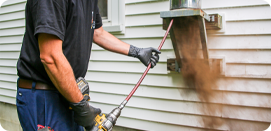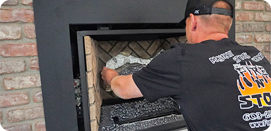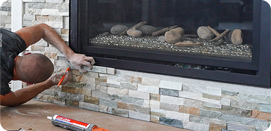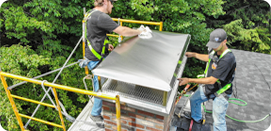Why is Water Coming In My Chimney?
Have you noticed water trickling down into your fireplace after a heavy rain? Water leaking into your fireplace isn’t normal and could indicate chimney or floor damage.
This article looks at how water leaks into your chimney, what damage it can cause, and what you can do to stop it.
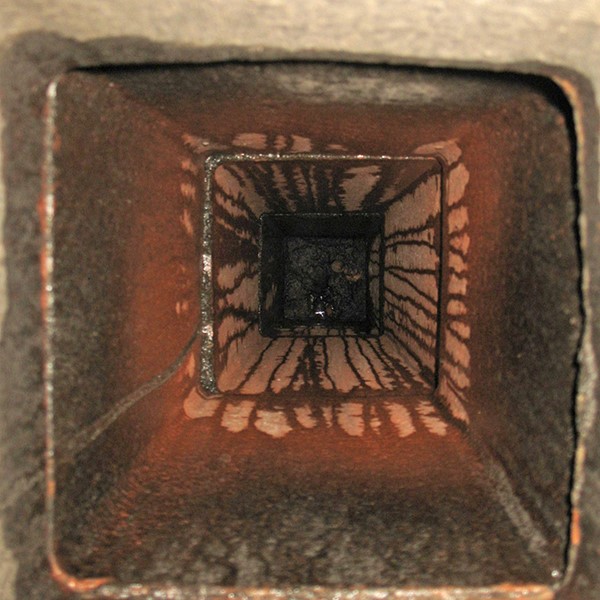 What’s Wrong With a Little Water?
What’s Wrong With a Little Water?
Mostly chimneys and fireplaces are made from masonry materials including brick and mortar. And while these materials are strong, they are susceptible to water.
Bricks, mortar, and concrete are porous, which means they absorb water like a sponge. And when the moisture freezes and thaws with the seasons, it expands, forming tiny cracks in the chimney.
Over time, these cracks get bigger and bigger until you have issues like brick spalling and cracked mortar joints, leading to water leaks.
The longer this goes unrepaired, the more water leaks into your chimney and home, and you may end up needing a complete chimney rebuild.
What Causes Chimney Leaks?
Chimneys are solid structures, but as we’ve seen, they’re not indestructible. Water is the number one enemy of chimneys, and it gets in through various avenues.
Chimney Crown
Ironically, the chimney crown is a concrete slab designed to protect your chimney and flue from water intrusion and damage. However, because it’s made from concrete, it’s susceptible to the same water damage that the bricks and mortar suffers from.
Over time, cracks form in the cap, allowing water to leak into the chimney and wreak havoc
Flashing
Flashing is water-tight strips put in by roofers to seal the seam between the roof and the chimney. However, if the contractor didn’t install the flashing correctly or the seal breaks down through wear and tear, it’s easy for water to get in through the gaps.
Masonry Damage
It’s common for some chimneys to receive more damage to one side versus another because they’re forward facing and take the brunt of extreme weather like snow, rain, and ice.
In these cases, the outward-facing side wears out more quickly than the others, causing brick spalling, which can cause leaks and weaken the chimney’s structural integrity.
Dangers of a Leaking Chimney
A leaking chimney doesn’t just endanger your chimney; it can also cause trouble inside the home.
Here are just a few ways water leaking through your chimney can damage your house.
Roof & Attic Damage
If water gets in through the flashing or your chimney, it can cause the wood support structures in your attic to deteriorate, which will compromise the integrity of your roof if you don’t catch and begin taking action.
Household Structural Damage
As water seeps down into your house or into the supports, they can also warp and rot.
Mold & Mildew
Anytime water gets into your house, it creates a breeding ground for mold and mildew, which is unsightly and can cause allergies and affect family members who have breathing issues.
Stains & Water Spots
If the leak is significant, you can end up with water stains or spots on your ceilings and walls or end up with warped wallpaper.
How to Protect Your Chimney From Leaking
The first step in preventing water from leaking through the chimney is to call a certified chimney service company to conduct a thorough inspection and diagnose the problem areas.
The next thing you can do is invest in a chimney cap if you don’t have one.
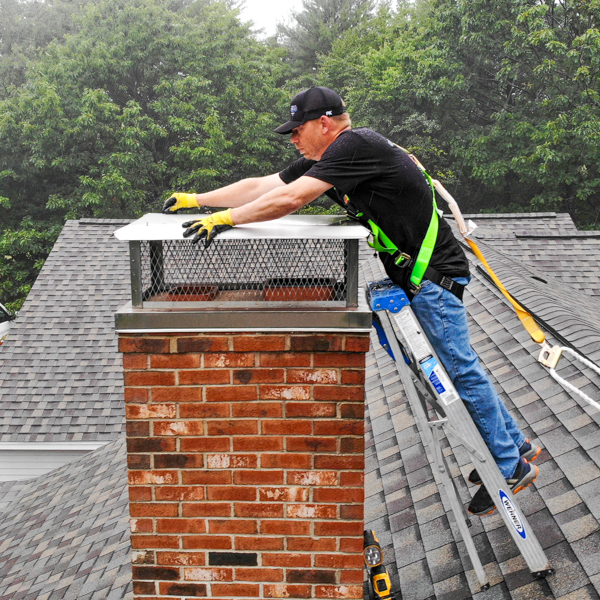 According to the Chimney Safety Institute of America:
According to the Chimney Safety Institute of America:
“We often get asked, ‘Do I really need a chimney cap?’ The answer is, without a doubt, yes. Chimney caps, also called rain covers, are probably the most inexpensive preventive measure that a homeowner can employ to prevent water penetration and damage to the chimney.”
Next, you must take good care of the chimney crown. As we saw above, this concrete slab sits on top of the chimney stack and takes the brunt of what Mother Nature has to offer.
The best way to take care of this is with an annual inspection from a trained professional who can spot minor damage and repair it before it worsens.
Lastly, waterproof your chimney.
As we’ve seen, nearly every part of your chimney is susceptible to water damage, and because chimney repair can be expensive, it’s in your best interest to invest in this cost-effective technique.
Today’s chimney sealing products keep water out while allowing the chimney to breathe. And they protect against the freezing and thawing cycles that wreak havoc on your chimney.
At Fire N’ Stone, we’re a family-owned and operated full-service chimney company offering maintenance, repairs, design, and fireplace sales and installations.
We’re located at 539 Laconia Rd, Tilton, NH, and proudly serve Laconia, Franklin, and Gilford residents. Contact us by calling 603-293-4040 or fill out our online form.


